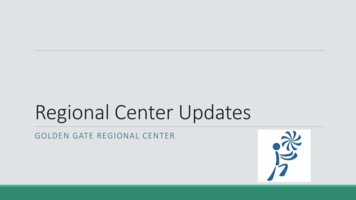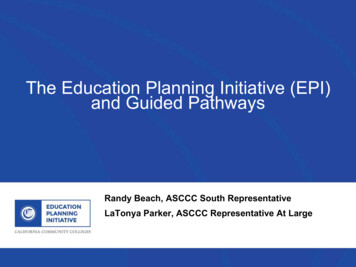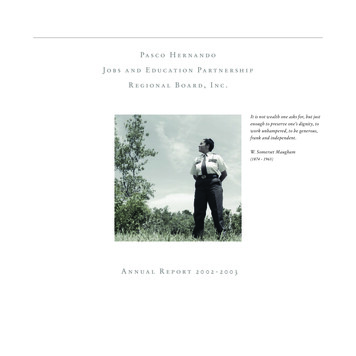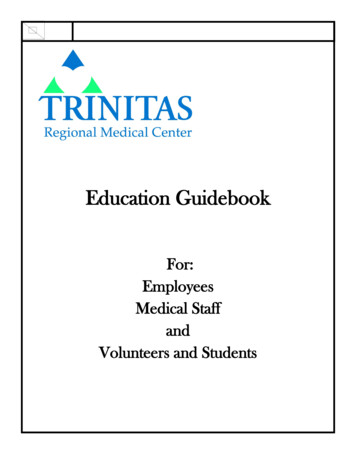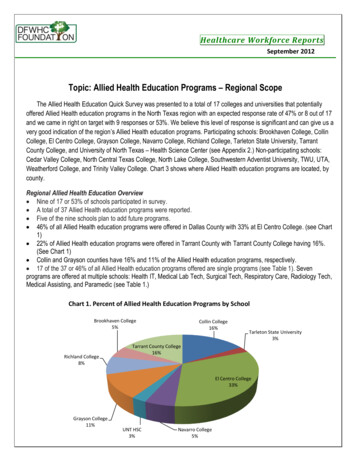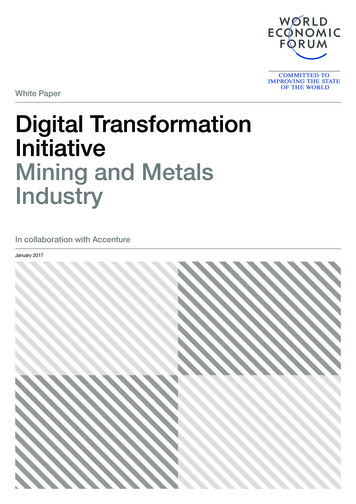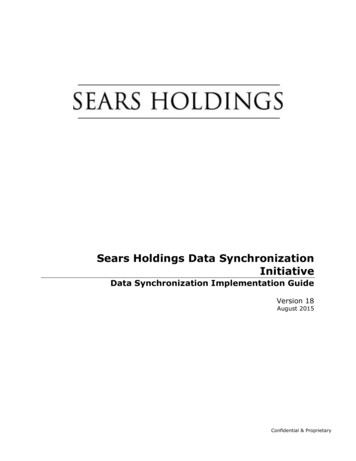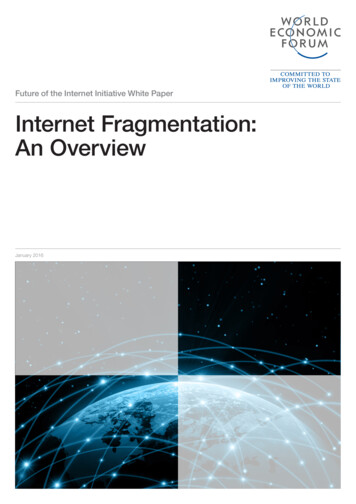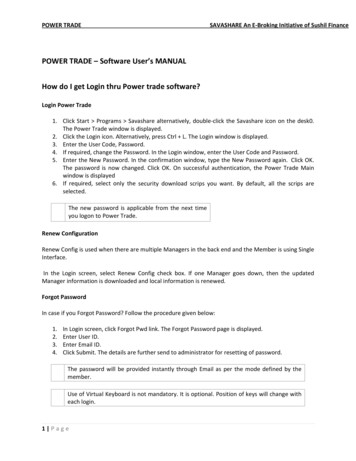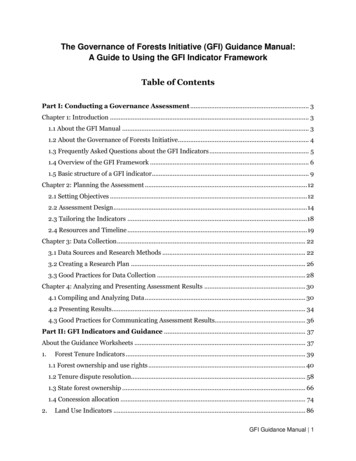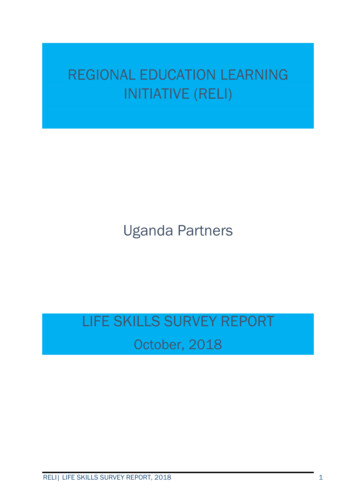
Transcription
REGIONAL EDUCATION LEARNINGINITIATIVE (RELI)Uganda PartnersLIFE SKILLS SURVEY REPORTOctober, 2018RELI LIFE SKILLS SURVEY REPORT, 20181
ACKNOWLEDGEMENTSThe Life skills cluster members are greatly appreciated for their contribution inconceptualizing ideas and approaches that facilitated the internal mapping of life skills ofmutual interest using Google Forms.Special thanks go to Matthew French (Komo Learning Centres) for the tool developmentas well as Martin Ariapa (LGIHE) for the data analysis and report drafting.RELI LIFE SKILLS SURVEY REPORT, 20182
Table of ContentsACKNOWLEDGEMENTS . 21. BACKGROUND TO THE SURVEY . 41.1.Introduction . 41.2.Aim of the Life Skills Cluster . 41.3.Purpose of the Survey . 41.4.Significance of the Survey . 42. MATERIALS AND METHODS . 52.1.Scope . 52.2.Data collection methods . 53. FINDINGS . 53.1.Names and addresses of the organizations surveyed. 53.2.Number of employees and volunteers . 63.3.African countries of operation . 73.4.Ugandan districts of operation . 73.5.Life skills of focus . 93.6.Activities that address life skills . 103.7.Measurement of life skills . 113.8.Tools used to measure life skills . 123.9.Target groups . 123.10.Other non RELI organizations implementing life skills in East Africa . 123.11.Most pressing questions about life skills . 133.12.Challenges faced by the organizations . 143.13.Technical assistance around life skills. 154. APPENDICES . 16Appendix 1: Organisation’s name, vision, mission, project name, description and how itaddresses life skills, and point person . 16Appendix 2: List of districts of operation within Uganda . 27RELI LIFE SKILLS SURVEY REPORT, 20183
1. BACKGROUND TO THE SURVEY1.1. IntroductionThe Life Skills cluster is part of the cross-country thematic clusters which include:Teacher Development and Support; Life Skills; and Equity and Inclusion under theRegional Education Learning Initiative (RELI) – a joint program of Wellspring and theAfrican Population and Health Research Center (APHRC). RELI’s core and long-term goalis to empower its members to become effective and influential organizations. The RELIobjectives include:1.2.3.4.Better coordination and alignment;Policy influence;Thematic principles of good practice;Improved learning outcomes.The first three objectives relate to cross-project learning which can be advanced at theregional and country level through several mechanisms within RELI.1.2. Aim of the Life Skills ClusterThis cluster was formed with the purpose to build and assess life skills, soft skills, andsocio-emotional learning both inside and outside the classroom, believing that theseskills are intricately linked with better education outcomes. Many of the groups in thiscluster work with marginalized youths. This group is largely composed of the followingcountry groups: Youth Development, Mentoring, and Life Skills (Tanzania); Developmentand Assessment of Soft Skills (Uganda); and Values and Soft Skills (Kenya).In Uganda, the Life skills cluster is comprised of eight partner organisations whichinclude: Luigi Giussani Institute of Higher Education, Komo Learning Centres, TwawezaEast Africa, Foundation for Inclusive Community Help, CEDA International, Fundi RoboticsLtd, Africa Educational Trust, and Educate!.1.3. Purpose of the SurveyThe survey was derived out of the need to understand the degree of intervention of RELImember partners working on life skills aspects in Uganda so as to map out a few lifeskills of mutual interest for collaboration purposes. This was also driven by the need tosingle out learning needs (such as challenges, best practises etc.); assessment; andimplementation methodologies of the organizations involved.1.4. Significance of the SurveyThe findings of this survey will enable RELI partners: Narrow down the scope of the life skills of interest;Agree upon life skills of mutual interest for collaboration;Learn from each other;Engage other thematic groups;Mitigate duplication and improve collaboration among members.RELI LIFE SKILLS SURVEY REPORT, 20184
2. MATERIALS AND METHODS2.1. ScopeThe survey mainly targeted RELI Uganda partners of the Life Skills cluster. However,members of other clusters (such as Teacher Development and Support, and Equity andInclusion) were also invited to participate.The survey was particularly designed to map out: interventions of memberorganisation/partners on life skills; geographical scope of operation; targetgroups/beneficiaries; methods of delivering the life skills interventions; and scale ofoperation.2.2. Data collection methodsPrior to the survey, consultative meetings were conducted with representative membersof the Life Skills cluster in order to agree on the scope of the survey and to develop anappropriate questionnaire to be used.The survey questionnaire was then designed using Google forms and made availableonline for completion and submission.The survey forms were completed by one representative from each target organization. Intotal, 15 organizations responded to the survey.3. FINDINGS3.1. Names and addresses of the organizations surveyedEight out of 15 organisations that participated in the survey belong to the RELI UgandaLife skills cluster. The names, years of establishment and addresses of the 15 surveyedorganizations are as shown below:Table 1: Name of the organisation, year of establishment and the address of the head officeName of the organisationYear ofEstablishmentAddress of the headofficeRELI ClusterFoundation for InclusiveCommunity Help (FICH)2010 Loro-Alidi, Oyam District,Northern UgandaLife SkillsFundi Robotics Ltd2014 Sayuuni Complex,Ntinda-Kisaasi Road, 2563920001592009 Mukono2009 Luzira, KampalaLife Skills2008 127 Mafinga Rd, offKinondoni Rd, PO Box38342, Dar es Salaam,TanzaniaLife SkillsKomo Learning CentresLuigi Giussani Institute ofHigher EducationTwaweza East AfricaRELI LIFE SKILLS SURVEY REPORT, 2018Life SkillsLife Skills5
International Institute ofRural ReconstructionAfrica Educational TrustBuild AfricaCEDA International2005 Plot 6, Charles LwangaRoad, Ministers villageNtinda, P.O Box 35536Kampala Uganda1958 UK, 88 Kingsway WC2B6AA1978 Block 245, Plot 431 &424 Kabalagala CentralZone, Off Gaba Road, POBox 7224, Kampala,Uganda2009 Kibuli Hill KakunguluRoadEducate!2008 Plot 3671 Mbogo RoadKibuliBuilding Tomorrow2006 AMFIU house plot 679,Wamala Rd,Najjanankumbi2000 5th Street IndustrialArea, KampalaMango Tree EducationalEnterprisesEquity and InclusionLife Skills; TeacherDevelopment andSupportTeacherDevelopment andSupportLife Skills; TeacherDevelopment andSupportLife Skills; TeacherDevelopment andSupportTeacherDevelopment andSupportTeacherDevelopment andSupportEquity and InclusionCOBURWAS InternationalYouth Organisation toTransform AfricaUganda Society forDisabled Children (USDC)2005 P.O.BOX. 34703,Kampala Uganda1985 Plot 112 Owen Road,Mulago HillEquity and InclusionWar Child Canada2005 Plot 1006, Block 244,Kironde Road, MuyengaKampala UgandaEquity and Inclusion3.2. Number of employees and volunteersThe surveyed organizations had varying number of employees and volunteers, rangingfrom the category of 0-5 to 21 staff.Table 2: Number of organisations per number of employees and volunteersNumber of people0–56 – 1011 – 2021 No. organizations (Employees)02310No. organizations (Volunteers)10104Most organizations (10/15) employ at least 21 people. No organization surveyedemploys less than 6 people.RELI LIFE SKILLS SURVEY REPORT, 20186
In terms of volunteer staff, most organizations (10/15) have recruited less than 6volunteers, while a quarter of the organizations have at least 21 of such staff.3.3. African countries of operationOrganisations surveyed have operations in a total of 16 African countries as shown in thefigure below:Figure 1: African countries of operationNote that, 7 organisations have operations in Uganda only while one of the organizationshas operations in 11 out of 16 of these countries.3.4. Ugandan districts of operationThe surveyed organizations are working in a total of 112 districts of Uganda. At least 5organizations operate in each of the following districts: Oyam, Gulu, Adjumani, Hoima,Kampala, Lira, Luweero, Masindi, and Pader.RELI LIFE SKILLS SURVEY REPORT, 20187
Figure 2: Districts of operationAlso note that, Twaweza East Africa works in all the 112 districts. Educate! operates in56 districts, Building Tomorrow in 28 districts while Foundation for Inclusive CommunityHelp, and COBURWAS International Youth Organisation to Transform Africa work in onlyone district, each (refer to Appendix 2: List of districts of operation within UgandaUganda RELI clusterThe organizations surveyed belong to at least one of the RELI Uganda clusters whichinclude: Life skills; Teacher Development and Support; and Equity and Inclusion.Table 3: Number of organisations surveyed per clusterClusterLife skillsTeacher Development and SupportEquity and InclusionOnly one clusterLife skillsEquity and InclusionTeacher Development and SupportTwo clustersTeacher Development and Support and Life skillsNo. of organisations8645433Eight out of 15 organisations belonged to the Life skills cluster. 6 belonged to TeacherDevelopment and Support, while 4 belonged to Equity and Inclusion. 12 organizationsRELI LIFE SKILLS SURVEY REPORT, 20188
belong to only 1 cluster each, while 3 of them belong to 2 clusters. None of theorganisations surveyed belongs to all the three clusters.3.5. Life skills of focusIn order to establish the life skills of interest, respondents were tasked to rank each ofthe 29 selected skills on a scale of 0 (no focus at all) to 4 (major focus). During analysis,3 categories were realized by merging “very little focus with some focus”; and “a lot offocus with a major focus” in order to easily map out the life skills of common interest.The number of organizations in each of these categories per skill is as shown below:Table 4: Organisations’ focus on the various life skillsNoVery little/someA lot of/major focusfocus focusProblem solving01Communication01Critical thinking02Teamwork02Positive sion making05Resilience05Self-awareness05Goal orientation05Integrity06Curiosity15Growth 7Honesty17Trustworthiness17Emotional regulation 18Friendship18Self-concept18Optimism19Grit29Life skillRELI LIFE SKILLS SURVEY REPORT, 2018141413131211111110101010998888887777666549
At least two-thirds of the organizations surveyed have “a lot of/major focus” on 12 out of29 life skills of interest. These include: Problem solving, Communication, Critical thinking,Teamwork, Positive attitude, Innovation, Creativity, Leadership, Decision making,Resilience, Self-awareness, and Goal orientation. Moreover, none of the organizationssurveyed had “no focus” on these skills.3.6. Activities that address life skillsAlmost all the organisations surveyed (13 out of 15) address life skills through directprogram implementation (e.g., training teachers, students, etc). Only 3 organisationsaddress life skills through policy development, as shown below.Figure 3: Organisations per life skill addressing activityNote that 3 organisations surveyed address life skills through direct programimplementation only. The rest address life skills through at least 2 activities.Some of the methods applied by the 13 organisations that conduct direct programimplementation in nurturing life skills include: capacity building sessions, mentorship,project-based learning, among others.RELI LIFE SKILLS SURVEY REPORT, 201810
Table 5: Methods applied in nurturing life skills by different organisationsMethods applied in nurturing life skillsCapacity building of school leaders and teachers(in using learner-centered approaches and alsoincorporate life skills in their lessons)No. of organizations8Peer mentorship and/or counselling of studentsand other youthsProject based learning73Life skills trainings for students and other youths2Edutainment (such as role plays, etc.)School ClubsGuided and unguided discoveryCase study documentation and sharing2211Note that 3 organizations that stated to be carrying out direct program implementation oflife skills did not mention any method applied in nurturing these skills.3.7. Measurement of life skillsThe methods stated by at least 50% of the organizations surveyed in measuring life skillsinclude: Observational assessments; Qualitative interviews; Baseline-endlinecomparison; Quantitative self-report surveys; and Qualitative focus groups. Otherapproaches are as shown below:Table 6: Organisations’ ways of measuring life skillsHow life skills are measuredObservational assessmentsQualitative interviewsBaseline-endline comparisonQuantitative self-report surveysQualitative focus groupsQualitative self-report surveys/short surveysPerformance assessmentsSimulations (e.g., group work, public speaking, etc.)Population surveysHousehold surveysRoutine monitoring and having one-on-one discussionsNo. of organisations129888766111Note that one of the organizations did not state any method on how it measures lifeskills.RELI LIFE SKILLS SURVEY REPORT, 201811
3.8. Tools used to measure life skillsNine out of 15 organizations surveyed have at least a tool to help them measure lifeskills. However, most of them use internally developed tools. These are in form of: Questionnairesportfolio assessmentstraining evaluation formsfocus group discussion guidelinesexperiential learning using 5D cycle observational rubricsleadership passbooksa citizen-led assessment toolactivity feedback formsOnly 2 organizations (Africa Educational Trust; and Komo Learning Centres) useinternationally adopted tools which include: EBI tool; USAID positive youth developmentmeasurement toolkit; and Life skills Assessment Scale by Kennedy, Pearson and Taylor.3.9. Target groupsThe target groups that the surveyed organizations mostly work with around life skillsinclude: teachers; school going children in primary and secondary schools; schooladministrators; parents and community members. Others are as shown below:Table 7: Life skills target groupsGroupTeachersStudents in primary schoolStudents in secondary schoolSchool administratorsParentsCommunity membersGovernment officialsOut-of-school youthCivil society organisationsAdult learnersPeople with disabilitiesUniversity studentsNo. of organisations13119988663221Only one organisation targets University students.3.10. Other non RELI organizations implementing life skills in East AfricaIn order to facilitate widening of the network of organizations working around life skills,respondents were asked to state organizations that they are aware of working on lifeskills in East Africa but are outside of the RELI network. These include:RELI LIFE SKILLS SURVEY REPORT, 201812
Crane Save the ChildrenViva KISA in TanzaniaPEAS Centre for creativityTPO-Uganda FAWEUStrong minds Hope for RwandaMentor, Coach and Empower UgandaCornerstone Development Africa (Uganda) UNICEFRed EarthUEFA foundationLife Skills foundationRestless DevelopmentSamburu Girls FoundationHope and Peace for Humanity3.11. Most pressing questions about life skillsA total of 35 most pressing questions about life skills were stated by the representativesof the organizations surveyed. During analysis, some of the similar questions weremerged by paraphrasing in order to cater for the stated views.The questions stated by at least 2 organizations include: How do we measure and/orassess life skills for the different categories of people (pupils/students in theclassrooms; out-of-school children/youths; children at household level, etc.)? How do weassess the impact of the life skills interventions on the different beneficiaries and/or inthe community? What are the key life skills needed by the different groups of people(pupils/students; adult learners, out-of-school youths, etc.) to live a meaningful lifeand/or to contribute to improved learning outcomes? How do we inculcate/incorporatelife skills in the teaching and learning processes (e.g. in the existing subjects)? How canwe foster life skills among the different people (e.g. on how to live with oneself; on how tomake critical decisions; on how to exhibit positive thinking, etc.)?RELI LIFE SKILLS SURVEY REPORT, 201813
Table 8: Most pressing questions about life skillsMost pressing questionsNo. of organizations1. How do we measure and/or assess life skills for the different categories ofpeople (pupils/students in the classrooms; youths; children at household7level, etc.)?2. How do we assess the impacts of the life skills interventions on the4different beneficiaries and/or in the community?3. How do we inculcate/incorporate life skills in the teaching and learning4processes (e.g. in the existing subjects)?4. What are the key life skills needed by the different groups of people(pupils/students; adult learners, out-of-school youths, etc.) to live a3meaningful life and/or to contribute to improved learning outcomes?5. How can we develop life skills among the different people (e.g. on how tolive with oneself; on how to make critical decision making; on how to exhibit2positive thinking, etc.)?6. How do we incorporate life skills into the curriculum?17. How can we monitor the application of life skills among the different1beneficiaries (students/pupils, youths, etc.)?8. How can we maximize the appreciation of milestones as key learning1achievements or outcomes?9. What tools exist for assessing life skills (e.g. at household level)?110. What competencies do trainers/teachers need to pass on life skills to1learners?11. To what extent can children demonstrate acquisition of life skills (such as1problem-solving and critical thinking)?12. How reliable are young people in gauging th
4. Improved learning outcomes. The first three objectives relate to cross-project learning which can be advanced at the regional and country level through several mechanisms within RELI. 1.2. Aim of the Life Skills Cluster This cluster was formed with the
